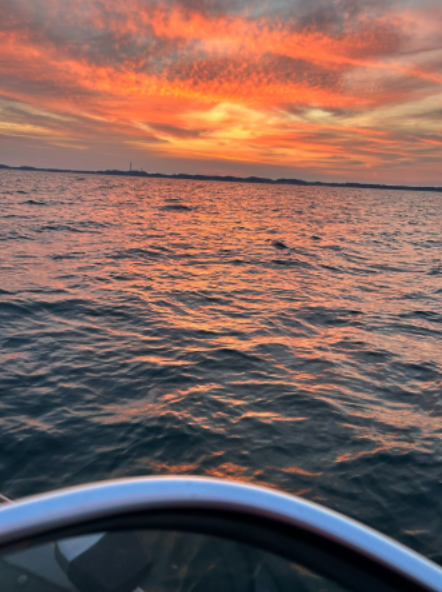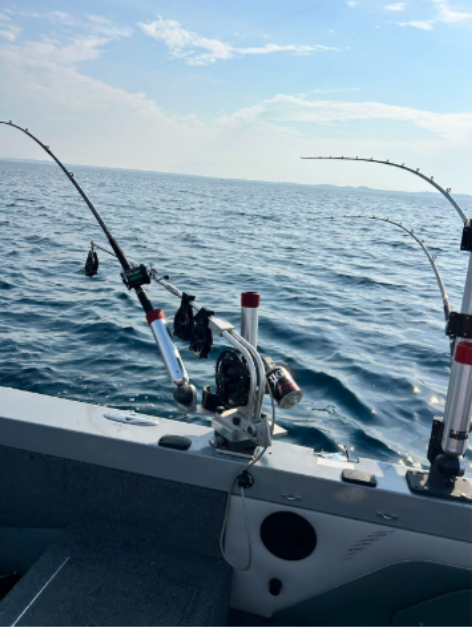It’s 4 a.m. on a warm July morning in Holland, Michigan. While most of the area is still fast asleep, a few dedicated anglers are already miles offshore, navigating the vast waters of Lake Michigan. Their goal? To hook the prized salmon. Because of a decision made in the mid-1960’s, the presence of salmon in Lake Michigan has benefited Holland and beach towns around Lake Michigan for generations to come.
The story of Holland’s salmon fishing industry began in 1966 with a simple decision: the introduction of coho salmon into Lake Michigan, followed soon after by Chinook (King) salmon. What began as a possible solution to an environmental problem has since evolved into a multi-million-dollar industry, shaping the community for generations to come.
In the 1960s, Lake Michigan faced a serious ecological challenge: Alewives, an invasive species that had found itself in the Great Lakes. These Alewives were overwhelming the lake and washing up in massive numbers along the shoreline, creating a disgusting and visually nonappealing beach scene. The native fish of Lake Michigan didn’t hunt alewives, so a natural predator was needed.
The introduction of salmon had a profound impact almost immediately. The fish kept the alewife population healthy, leading to cleaner beaches and a healthier ecosystem. But the effects didn’t stop there. Over time, what began as an ecological fix transformed into an economic boom as communities around Lake Michigan, including Holland, received benefits of a thriving salmon fishery.
Salmon fishing has improved the lake and fueled an entire industry. The addition of salmon caused bait and tackle shops, marinas, restaurants, and tourism. Anglers from across the country began flocking to Holland, eager to experience the thrill of salmon fishing, whether through charter services or on individual expeditions.
Beyond recreation, salmon fishing has also contributed to the local food industry, providing fresh, locally harvested fish. The sport has become a beloved activity, with families and friends bonding over early morning outings on the lake. Charter businesses like Unsalted Outfitters have flourished, offering visitors and locals a chance to experience world-class fishing while supporting the local economy.
“As the owner and captain of Unsalted Outfitters, I’ve had the privilege of becoming an active member of Holland’s vibrant fishing community. My journey started in the late ’70s as a kid going out on charters, and I was instantly hooked on the thrill of this incredible outdoor activity. It’s been a blessing to turn that passion into a business and share it with others. For me, charter fishing is about more than just reeling in fish; it’s about fostering connections within our community and telling the story of this fishery. Every trip we take not only creates memories but also supports local businesses, creates jobs, and helps our community thrive, one catch at a time. We are truly fortunate to call Michigan home.” Captain Scott Charon said.
Beyond its economic impact, salmon fishing provides an incomparable recreational experience. The thrill of battling a powerful fish, the feeling of being on the water, and the friendships among anglers make it a favorite pastime for many. 
“Salmon fishing is an exhilarating experience that blends the thrill of the catch with the beauty of nature. I love getting on the water early, feeling the crisp morning air, and watching the sunrise cast a golden glow over the lake. The anticipation builds as I wait for that moment when the fishing rod jerks violently, and the reel starts screaming because a big King salmon has taken the bait. It’s often a team effort, especially when multiple fish are on the line. The boat becomes a hive of activity, sometimes chaotic, sometimes like a well-choreographed dance. But the best part? The memories. My youngest son is just as passionate about fishing as I am, maybe even more. Not many teenagers will eagerly wake up at 3:30 AM to go fishing, but seeing him learn from me and knowing that soon, he’ll start teaching me new things, it’s priceless.” Recreational captain Ken Schneider said.
Salmon fishing continues to be a defining part of Holland’s culture and economy, so conservation and sustainable fishing practices remain crucial. Local and state organizations are working to maintain balanced fish populations, ensuring that future generations can continue to enjoy the benefits of this thriving fishery.
What started as a solution to an environmental problem has developed into something much greater, an industry that helps businesses thrive, strengthens communities, and brings people together. From the thrill of the catch to the economic impact, salmon fishing is more than just a pastime in Holland; it’s a way of life. And as long as the waters of Lake Michigan remain home to these incredible fish, the legacy of that small decision in the 1960s will continue to shape the region for generations to come.







